Introduction: The specificity of female entrepreneurship in the context of the quality of life
According to the research, every third enterprise in the world is run by women (OECD 2017). Such companies are usually distinguished by the following features: they are micro-enterprises, they have a low level of capitalization, and they are slow to expand into foreign markets (Siemieniak, Łuczka, 2016). The development of enterprises run by women is somewhat limited, which may result from the negative attitude towards taking the role of business owners by women.
Social conditions and stereotypes of gender roles make women assimilate a special hierarchy of values, i.e., they spend less time in the company or choose service activities that can be managed from home (Zięba, 2010). Women’s entrepreneurship, understood as the tendency to start their own business, is restricted not only by the belief that they are poorly prepared to set up companies. The growth of an enterprise depends on the ability to balance the requirements of professional and family life, including, in particular, the role of a mother (Siemieniak, Łuczka, 2016).
The importance of entrepreneurship for women’s quality of life is not clear. On the one hand, PARP research shows that it is easier to make the decision to start a business when one does not yet have family responsibilities, due to the difficulty of engaging in both these roles at the same time. On the other hand, some studies show that the necessity to cope with family responsibilities may stimulate the decision to set up one’s own business (Siemieniak, Łuczka, 2016). Such an approach may result from associating self-employment with better earnings and flexible working hours.
The concept of well-being is not often mentioned by researchers dealing with female entrepreneurship. Therefore, it seems appropriate to deepen this issue in research on entrepreneurial initiative, which is extremely important for economic development.
Welfare, well-being and quality of life
Welfare is a universally recognized goal in the development of societies and individuals. It is directly related to the high level of a country’s socio-economic development. In research on the quality of life, this concept refers to living conditions and is considered in relation to the functioning of the economic system (Walaszek, 2017). The term “welfare state” is also used to mean that the most important task of the state authority should be to ensure the economic and social welfare of citizens in accordance with the principles of equitable distribution of wealth and equal opportunities. The “welfare state” assumes responsibility for providing its citizens with a basic, modest standard of living (Esping-Andersen 2010).
The concepts of welfare and mental well-being are not the same, the former denoting the level of affluence and wealth, and the latter the non-material conditions of a good life, such as happiness. However, more and more often, the sense of socio-economic security or lifestyle is included in the scope of individual welfare (Zaremba 2016). Therefore, the concept of mental well-being can be distinguished from the broader concept of welfare.
“Well-being” as a mental state is the effect of cognitive and emotional assessment of one’s own life that leads to a strong feeling of fulfillment and satisfaction. It is a feeling resulting from self-realization, a positive appraisal of one’s own life and a low level of stress (Niśkiewicz, 2016). Individuals are in a state of mental well-being when positive experiences and pleasant emotions prevail in the environment, outweighing negative experiences and moods (Kasperek-Golimowska 2012, p. 183).
Mental well-being is characterized by variability in the individual’s life cycle. People who experience it are more effective in their activities and can use the available environmental resources better (Myers 2000, after: Jach 2013). Mental well-being can be described in six categories: self-acceptance, personal development, having a purpose in life, controlling the environment, autonomy, and positive relations with others (Cieślińska 2013, p. 102).
Welfare is described in OECD countries and other large economies based on the survey of eleven dimensions of people’s quality of life. They are: income and wealth; place of work and earnings; living conditions; health; work-life balance; education and skills; social contacts; civic engagement; environmental quality; personal security; and subjective well-being. According to the authors of an OECD report, these dimensions create the so-called “well-being”. Since the publication of the first OECD study in 2011, it has become increasingly important to measure well-being around the world, and to publicly debate what matters to citizens (http://www.oecd.org/sdd/OECD-Better-Life-Initiative.pdf).
- Czapiński equates quality of life with well-being or happiness. Interestingly, the quality of life is measured using both objective criteria (living conditions) and subjective criteria (social, material, environmental, health-related). The subjective dimension has to do with the evaluation of one’s own life (Wnuk, 2013).
An important element of the quality of life is the quality of working life. M. Porter points out that the factors that influence the quality of work may refer to (Efrata, Sirgy, 1990):
- characteristics specific to the individual (e.g., attitudes and needs);
- essence of work (internal rewards, level of autonomy, degree of differentiation of activities);
- work environment (e.g., readiness to achieve goals, the ability to transform knowledge, abilities and skills).
The literature on the subject also mentions the concept of employee well-being. In research on this phenomenon, it is assumed that good management may consist in reconciling the imperative of organizational productivity with increasing employee well-being while maintaining the strategic perspective of the organization. Increasing well-being at work brings benefits for both employees and the employer (Kozioł, Wojtowicz, 2016).
It should be stated that the quality or standard of living is an ambiguous concept that can be treated in an objective or subjective way. In the former case, we are dealing with the quality of life itself, and in the latter – with the sense of the quality of life (Kasprzyk, 2012)
Moreover, many studies show that there are differences between women and men in their subjective assessment of well-being when it comes to its types and components. They result from many biological, individual and environmental factors, such as country-specific social norms that determine the accepted characteristics and behaviors assigned to different genders (Batz, & Tay, 2018).
Meeting the need for safety as a basis for the well-being of female entrepreneurs
The success of entrepreneurial activity is most often measured by economic indicators and equated with the development of the enterprise, which is evidenced by the expansion of its area of activity, the sales market or the number of customers. However, in the case of entrepreneurial activities undertaken by women, success also depends on significant subjective factors, such as work satisfaction, achievement of aspirations (motivation) and satisfaction with personal life (life satisfaction) (Denkiewicz-Kuczewska, 2012).
It is worth noting that the subjective factors associated with running one’s own business also involve a diminished sense of security compared to full-time work. Entrepreneurs are forced to constantly confront uncertainty due to the changing market situation and competition. The sense of security is of particular importance for self-employed women, who, for a long period of their lives, bear the responsibility resulting from their role as mothers (Siemieniak, Rembiasz, 2017). The sense of security means a subjective assessment of the level of acceptable risk (Klamut, 2012). When running one’s own business, risk factors should be identified and, above all, controlled at each management level (Stańczak, 2014). In order to feel in control, people are forced to constantly assess the level of threats, knowledge gaps and ambiguity (Sadłowska – Wrzesińska, et al., 2016). An individual lives in conditions of constant uncertainty, i.e. a mismatch between the knowledge required and the knowledge available to make a decision (Stańczak 2014).
Despite being exposed to uncertainty, entrepreneurs experience a higher level of job satisfaction and quality of life. It is believed that the factor that determines their well-being is a sense of autonomy and control expressed by the flexibility in assigning tasks as well as the time and
methods of their implementation (Siemieniak, Rembiasz, 2018). Flexible working time is defined as: adaptable duration of work, shortened working week, flexible starting and ending hours (Gerlach, 2014). Control over the organization of work may give a sense of work comfort, because it allows for a better adjustment of professional and private activity (Siemieniak, Rembiasz, 2018). Empirical research shows that entrepreneurs can strike a better work-life balance than non-entrepreneurs. Moreover, those entrepreneurs who were motivated by the emergence of an opportunity achieve not only balance but also satisfaction (Zbierowski, 2016).
The research results show that entrepreneurial women differ significantly in their sense of social well-being from women not engaged in entrepreneurial activity, experiencing a sense of acceptance and realization in society, improvement of their relations with the environment and autonomy in decision making. Therefore, running one’s own business has a clear impact on increasing the sense of social well-being. In addition, the fact of running a business increases mental well-being and work satisfaction. At the same time, it can be assumed that people who are more satisfied with their lives have greater self-confidence and it is easier for them to take on the challenges of self-employment. It can therefore be concluded that female entrepreneurs differ from other women in terms of their personality characteristics (Denkiewicz-Kuczewska, 2012).
Needs of female entrepreneurs that determine well-being – review of the results of own research.
In some concepts, the quality of life in general, including the quality of professional life, is equated with the satisfaction of needs (Pate, 1988). Determining the needs and the degree of their satisfaction in women running their own business is an important factor affecting entrepreneurship development.
Therefore, the aim of the undertaken research was to identify the needs related to running one’s own enterprise (actually or potentially). The research carried out in 2013/14 involved a representative group of business owners from the SME sector in the Wielkopolska region and a group of students in economics. In total, 384 women-owners and 181 female students were included in the research, and the groups of respondents were created on the basis of quota selection. The actual state was compared with the imagined state by juxtaposing the needs declared by the current owners of enterprises with the needs of female students, i.e., a group of potential entrepreneurs. It is worth mentioning that more than half (56%) of the current female entrepreneurs believe that they have achieved success in life, which can be considered a significant indicator of well-being. Moreover, students who intend to run their own business are motivated mainly by a desire for decent earnings (40%), while business owners cite a desire to use their knowledge and skills (studied profession) (33.6%), and, in a similar proportion, independence (31.3 % of responses). Most of the obtained results reveal a positive motivation, i.e., women are pulled rather then pushed towards enterpreunership. This leads to conclusions about respondents’ welfare, which is in line with the economic development indicators for Wielkopolska, a region considered to be one of the most economically developed in Poland (Siemieniak, Łuczka, 2016).
The table below presents the five most frequently reported factors necessary for the effective running of an enterprise (Table 1). The assessments of female business owners are similar to those of female students who are potential entrepreneurs. Both groups selected the same five top needs out of the thirteen suggested. In the opinion of the owners, the possibility of working flexible and variable hours is ranked second, right after the need for financial support.
Table 1: Factors necessary to run a business – in the opinion of women

* The respondents gave more than one answer. Responses add up to 100% for all 13 factors.
Source: own research, based on Siemieniak, Łuczka, 2016, p. 85
The obtained results can be applied both to the mental well-being of women and the broadly-defined welfare of entrepreneurs. Running one’s own business on the one hand provides the basic source of income or additional income that improves the financial situation of the family, and on the other, contributes to women’s sense of self-fulfillment and influence whilst confirming their potential.
The conclusions were extended with the results of another study in 2017 (Siemieniak, Rembiasz 2018). These focused on the diagnosis of entrepreneurial attitudes in the context of balancing the requirements of personal and professional life of potential entrepreneurs. The author used her original auditorium survey method to carry out research among 160 students of economic faculties of Wielkopolska universities. Two thirds of the respondents were women. The study revealed the importance of factors necessary for the so-called work-life balance, one of the premises of the mental well-being of working people, including those who are self-employed. The most important factor for the respondents was flexible working time, followed by: home work, being relieved from some of the household / caring responsibilities, the possibility of relaxing at any time of the day and part-time work (Siemieniak, Rembiasz 2018).
Results of research on the quality of life of female students as potential entrepreneurs
The study was conducted in January 2020 and aimed at determining the relationship between the quality of life of students and their entrepreneurial intentions (plans for self-employment). It involved a group of students of management at one of Polish non-public universities, and the research tool was an auditorium survey. The respondents were asked to react to the statements specified in the questionnaire and reveal their subjective feelings about the quality of their lives. The authors of the study are aware of the limitations of survey research. The result could have been influenced by the place (lecture hall) and the respondents’ guesses about the results expected by the authors of the research.
This article presents some of the research results, that is those that were obtained from a homogeneous group of 130 young female students aged 21-28. The university where the research was carried out offers the possibility of combining education with work and personal life. The idea is therefore to keep the work-life balance – one of the factors that determine mental well-being. The table below presents the results concerning the entrepreneurial intentions of the surveyed female students and their involvement in professional work.
Table 2: Responses to the question: “Are you interested in running your own business?”

Source: own research
The table above shows that a relatively large group of respondents, as many as 40.8%, is interested in running their own business. Only two students were already self-employed, which is due to the young age of the respondents. A fairly high percentage of active entrepreneurial intentions should be explained by the studied field of business management, which the surveyed young women had chosen consciously. Moreover, 95% of the respondents worked for profit. The authors of the research assumed that students with active entrepreneurial intentions assess their quality of life in more positive terms, achieving a higher level of well-being than people who do not plan to run their own business or do not know yet whether they want to start such an activity.
The results of the study focused on selected areas of well-being according to the previously mentioned OECD classification are presented below. Table 3a presents the results concerning income and wealth, place of work, living conditions and health of students who want to run their own business or already run one. Table 3b contains the answers of female respondents who do not plan to start a company, while Table 3c applies to women who do not know whether they want to start their own business.
Table 3a: Selected material and health aspects of well-being of female respondents with active entrepreneurial intentions
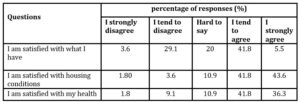
Source: own research.
Table 3b: Selected material and health aspects of well-being of respondents not planning to start a business
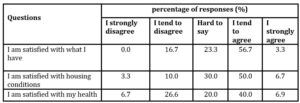
Source: own research.
Table 3c: Selected material and health aspects of well-being of the respondents who do not know whether they want to become entrepreneurs
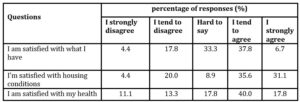 Source: own research.
Source: own research.
Comparing the results from the above three tables, the following conclusion can be drawn: personal wealth achieved highest scores among students who do not intend to run their own business. This may be due to the fact that, if they are in a good financial situation and earn attractive salaries, young people do not want to give up their full-time job in order to run a business which is risky. The table also shows that future potential entrepreneurs are less satisfied with their assets. Therefore, the motives for starting a business in this group include the desire to achieve higher income than in the case of contract work. It is important to bear in mind that the presented empirical research did not reveal the actual wealth status of the respondents, but only their subjective assessment of it. Both groups could therefore be very similar in terms of their wealth and income expressed in money, but students with active entrepreneurial intentions might set themselves higher goals in this respect. On the other hand, for the second group, lower income was considered sufficient.
Moreover, people who are the least satisfied with their housing conditions belong to the group that does not plan to start a business. Here, too, a large proportion of the respondents replied: “It’s hard to say.” This may be due to the fact that, in Poland, the predominant means of buying one’s own apartment is a bank loan and, to obtain a housing loan, entrepreneurs must meet more stringent requirements than in the case of contract work. If a business is the only source of income, banks require the submission of net income statements for the last twelve months or even up to two years. Therefore, banks may refuse to grant a loan due to the uncertain situation of a company that has operated for a short time. In addition, entrepreneurs must prove the amount of income required to be considered credit worthy (https://www.totalmoney.pl/artykuly/71836,kredyty-dla-firm,kredyt-hipoteczny-a-dzialalnosc-gospodarcza-2020—jaka-mam-zdolnosc-kredytowa-przy-oło-firmy,1)
When it comes to health, it was rated highest by people planning to establish an enterprise.
The following tables present the assessment of elements related to psychological well-being, such as work-life balance, social contacts and subjective well-being.
Table 4a: Selected psychological aspects of well-being of female respondents with active entrepreneurial intentions
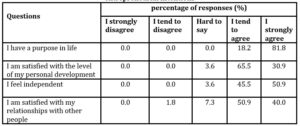 Source: own research.
Source: own research.
Table 4b: Selected psychological aspects of well-being of the respondents who do not plan to start a business
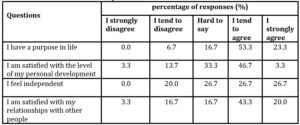 Source: own research.
Source: own research.
Table 4c: Selected psychological aspects of well-being of the respondents who do not know whether they want to start their own business
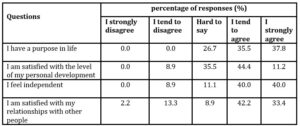
Source: own research.
Self-esteem regarding a clear goal in life, the assessment of one’s own personal development and the feeling of being independent and satisfied with relationships with other people scored highest, on average, in students who plan to become or are currently entrepreneurs, and lowest in those who do not want to start their own business. This means that, in the surveyed group of women, the sense of mental well-being increases the likelihood to become an entrepreneur.
The last set of three tables deals with education and skills as important components of well-being.
Table 5a: Selected aspects of well-being related to education and skills of respondents with active entrepreneurial intentions

Source: own research.
Table 5b: Selected aspects of well-being related to education and skills of respondents who do not plan to start a business
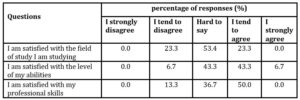 Source: own research.
Source: own research.
Table 5c: Selected aspects of well-being related to education and skills of respondents who do not know whether they want to become entrepreneurs

Source: own research.
The results presented in the tables above prove that students with active entrepreneurial intentions assess their skills and professional abilities higher than the rest of the students (cf. Tables 5a, 5b, 5c). They also chose their field of study more consciously as the majority of them decided that they liked their program. Therefore, they are probably more likely to have clear plans for the future and use the knowledge from the studies in their professional lives. The authors of the research are obviously aware of the fact that the presented survey results are not representative due to the non-random selection of the sample and this study should be treated rather as a case study.
Summary
The presented article is an attempt to show the relationship between the concepts of prosperity and well-being and professional activity of entrepreneurs. It particularly refers to the group of women-owners, who are underrepresented among entrepreneurs in Poland and globally. Conducting the research in question is justified from the perspective of the economic development of the entire region. The use of internal resources of each individual contributes to the increase in the welfare of the entire society. Knowledge of the factors determining mental well-being is the basis for shaping entrepreneurial attitudes of young people and enables their professional activation.
Well-being and mental well-being should be considered jointly, which means that the analysis of starting and running a business should take into account both objective economic factors and the subjective feelings of potential entrepreneurs.
The conducted research shows that in the group of women who intend to start a business, a surprisingly high level of satisfaction with life and relationships with others was revealed, as well as a high level of self-satisfaction compared to the other groups of respondents. Interestingly, between young women who want to start their own business, and those who do not intend to do so, the difference is greater in terms of satisfaction with intangible assets than with the material situation (such as e.g., satisfaction with the state of ownership).
A subjective, positive assessment of intangible assets can be crucial in triggering entrepreneurial behavior among young women. The case studies conducted show that women experiencing greater well-being will be more likely to start their own business. An important direction for further research should be exploring the relationship between entrepreneurship and mental well-being. In addition, further research may concern current female entrepreneurs and check the inverse relationship, i.e., whether running your own business contributes to higher life satisfaction.
Although psychological well-being may be subjective, it seems reasonable to look for recurrent themes that characterize groups. It is worth referring to the concept of man formulated on the basis of humanistic psychology, which states that needs guide human action. Their recognition may constitute a point of reference for the creators of social policy.
(adsbygoogle = window.adsbygoogle || []).push({});
References
- Batz, C., & Tay, L. (2018), Gender differences in subjective well-being, Handbook of well-being E. Diener, E., Oishi, S. & Tay, L. (eds.),. Salt Lake City, UT: DEF Publishers.
- Byrnes, J.P., Miller, D.C., Schafer, W.D. (1999), ‘Gender Differences in Risk Taking: A Meta-Analysis,’ Psychological Bulletin, Vol 125(3), May 1999, 367-383.
- Cieślińska J. (2013) ‘Poczucie dobrostanu i optymizmu życiowego kadry kierowniczej placówek oświatowych,’ Studia Edukacyjne, 27, 95–112.
- Denkiewicz-Kuczewska M, (2012) ‘Stereotypowe myślenie, satysfakcja z pracy i dobrostan psychiczny u kobiet prowadzących i nieprowadzących działalność przedsiębiorczą,’ Psychologia ekonomiczna 2, 22-37.
- Efraty D., Sirgy M.J. (1990), ‘The effects of quality of working life (QWL) on employee behavioral responses,’ Social Indicators Research, 22 (1), 31-47.
- Esping-Andersen G. (1990), The Three Worlds of Welfare Capitalism, Cambridge: Polity Press.
- Gerlach, R. (2014), Przemiany pracy i ich konsekwencje dla relacji praca- życie pozazawodowe. Relacja praca- życie pozazawodowe drogą do zrównoważonego rozwoju, Tomaszewska-Lipiec R. (ed.). Bydgoszcz: Wydawnictwo Uniwersytetu Kazimierza Wielkiego.
- OECD (2011), How’s Life? Measuring Well-Being?, [Online], [Retrived 20.08.2020], http://www.oecd.org/sdd/OECD-Better-Life-Initiative.pdf
- https://www.totalmoney.pl/artykuly/71836,kredyty-dla-firm,kredyt-hipoteczny-a-dzialalnosc-gospodarcza-2020—jaka-mam-zdolnosc-kredytowa-przy-oło-firmy,1
- OECD (2017), OECD Better Life Index, [Online], [Retrieved 01.2017], http://www.oecdbetterlifeindex.org/topics/work-life-balance/
- Jach Ł. (2013), „Wyznaczniki akademickiej i pozaakademickiej aktywności studentów w kontekście jakości ich życia,’ [Online], [Retrived: 25.01.2017], http://www.sbc.org.pl/dlibra/doccontent?id=97950.
- Kasperek-Golimowska E. (2012), ‘Nadzieja i optymizm vs zwątpienie i pesymizm w kontekście „dobrego życia” w kulturze konsumpcji,’ Studia Edukacyjne, 19, 179–213.
- Kasprzyk B., (2012), ‘Subiektywizm ocen dobrobytu ekonomicznego na przykładzie gospodarstw domowych w regionie podkarpackim,’ Nierówności Społeczne a Wzrost Gospodarczy, nr 25, 191-201.
- Klamut R. (2012), ‘Bezpieczeństwo jako pojęcie psychologiczne (Security as a psychological concept),’ Zeszyty Naukowe Politechniki Rzeszowskiej 289, Ekonomia i Nauki Humanistyczne, 19 (4), 41-51.
- Kozioł L., Wojtowicz A, (2016), ‘Wybrane praktyki zarządcze a dobrostan pracowniczy,’ Zeszyty Naukowe Politechniki Poznańskiej, Organizacja i zarządzenie 71, 165-177.
- Niskiewicz Z. (2016), ‘Dobrostan psychiczny i jego rola w życiu człowieka,’ Studia krytyczne 3, 139-151.
- Pate L.E., Sullivan D.L.(1988), ‘Converging paradigms of the causes of human behavior: Interpersonal valence and organizational climate,’ Psychology A Quarterly Journal of Human Behavioral, 25 (1), 18-23.
- Rembiasz, M. (2016), ‘Entrepreneurship of single mothers: selected economic and social aspects,’ Zeszyty Naukowe Politechniki Poznańskiej. Organizacja i Zarządzanie, 68, 167-179.
- Sadłowska – Wrzesińska, J., Górny, A. & Mościcka – Teske, A.(2016), The outcomes of shift working the context of psychosocial functioning – sex aspects, Occupational Safety and Hygiene IV: 197-201, Arezes, P. et al. (eds.), London: CRC Press, Taylor and Francis Group.
- Siemieniak P., Rembiasz M., (2018), ‘Work- life balance w życiu kobiet- obecnych i potencjalnych przedsiębiorców,’ Zeszyty Naukowe Politechniki Poznańskiej, Organizacja i Zarządzanie, 76, 229-242
- Siemieniak, P., Łuczka, T. (2016), Przedsiębiorczość kobiet. Wybrane aspekty ekonomiczne i psychokulturowe. Poznań: Wydawnictwo Politechniki Poznańskiej.
- Siemieniak, P., Rembiasz, M. (2017), ‘Determinanty przedsiębiorczości kobiet – wybrane aspekty teoretyczne i empiryczne,’ Przedsiębiorczość i Zarządzanie, 18(12.II), 349–363
- Skrzypek E. (2001) „Czynniki kształtujące jakość życia”, [Online], [Retrived 12.12.2019], org.pl/Lodz/Mken/Mken%202001/Referaty%202001/14.pdf,
- Skrzypek E. (2000) Jakość i efektywność, Wyd. UMCS, Lublin
- Stańczak A. (2014) „Ryzyka prowadzenie działalności gospodarczej w Polsce ze szczególnym uwzględnieniem sektora małych i średnich przedsiębiorstw,’ ZNUV (35) 82-98, [Online], [Retrived 8.04 2020], icm.edu.pl
- Tyszka T. Domurat A. (2004), ‘Czy istnieje ogólna skłonność jednostki do ryzyka?,’ Decyzje 2, 85-104
- Walaszek M., (2017), ‘Well being- jakość życia w publikacjach i opracowaniach instytucji oraz organizacji międzynarodowych,’ Studia i Materiały. Miscellanca Oeconomicac, Yr 21, 3/2017, Vol. I, Wydział Prawa Administracji i Zarządzania, Uniwersytet J. Kochanowskiego w Kielcach.
- Wnuk M. Zielonka D., Purandare B., Kaniewski A., Klimberg A., Ulatowska-Szostak E., Palicka E., Zarzycki A., Kaminiarz E., (2013), „Przegląd koncepcji jakości życia w naukach społecznych,’ Hygeia Public Health , 48(1), 10-16.
- Zaremba M. (2016) ‘Dobrobyt społeczny – problemy metodologiczne i definicyjne,’ Zeszyty Naukowe Polskiego Towarzystwa Ekonomicznego w Zielonej Górze, 4, 323–331 [Online], [Retrieved 02.02.2016], hop://happyplanetindex.org/
- Zbierowski, P. (2016). Paradoks efektów przedsiębiorczości: satysfakcja i work-life balance. Imperatyw przedsiębiorczości a odpowiedzialność przedsiębiorcy. Prace Naukowe Uniwersytetu Ekonomicznego we Wrocławiu, 419, 265-275.
- Zięba K. (2010), Płeć właściciela/menedżera jako czynnik kształtujący rozwój małej firmy- aspekty teoretyczne i wyniki badań empirycznych, Strategie zarządzania mikro i małymi przedsiębiorstwami. Mikrofirma 2010. Bielawska A. Szopa A. (ed) Uniwersytet Szczeciński. Zeszyty Naukowe nr 585. Ekonomiczne Problemy Usług nr 50, Szczecin.













